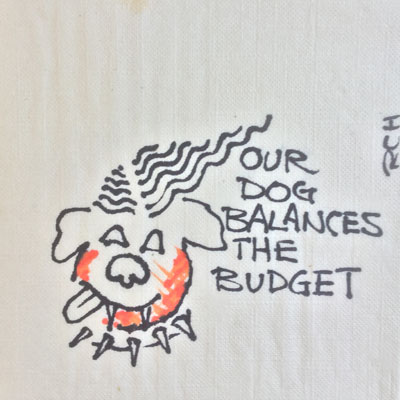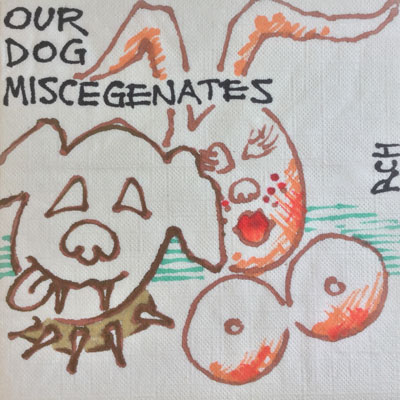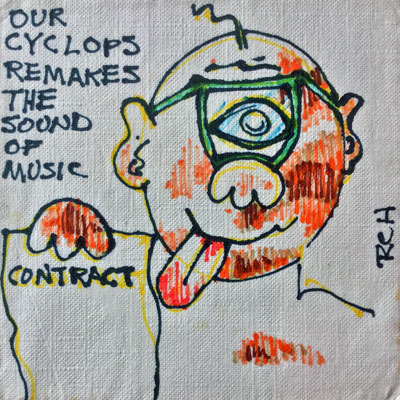[Click on BLUE links for sources and information]
Every nation gets the government it deserves. Joseph de Maistre
In a democracy, the people get the government they deserve. Alexis de Tocqueville
The government you elect is the government you deserve. Thomas Jefferson
Democracy is a device that ensures we shall be governed no better than we deserve. George Bernard Shaw
People have a tendency to blame politicians when things don’t work, but as I always tell people, you get the politicians you deserve. Barack Obama

Sea Gull Cellar Bar Napkin Art, Roy Hoggard artist
A lot of ink has been spilled recently on the topic of tribalism and political division in America. Articles and books have been penned by the experts. Studies by psychologists, political theorists, and historians pile up by the pound. Many Americans feel uneasy in our current political environment although they may not know why or what to do about it. Some, as the old adage goes, remain ignorant and apathetic by choice: they don’t know and they don’t care. Perhaps they are under the illusion that they don’t have a dog in the fight. But, they do. We all do.
No doubt the Presidency of Donald Trump has been in part responsible. But, Trump is more a symptom than a cause. We have been divided before. Remember the Civil War? Some trace our growing political division to the rise of the conservative movement, from Goldwater to Nixon to Reagan to Gingrich to The Moral Majority to the Tea Party. No doubt there is some truth in that but others point out that tribalism is in our roots, in our DNA.

Sea Gull Cellar Bar Napkin Art, Roy Hoggard artist
The causes of America’s resurgent tribalism are many. They include seismic demographic change, which has led to predictions that whites will lose their majority status within a few decades; declining social mobility and a growing class divide; and media that reward expressions of outrage. All of this has contributed to a climate in which every group in America—minorities and whites; conservatives and liberals; the working class and elites—feels under attack, pitted against the others not just for jobs and spoils, but for the right to define the nation’s identity. In these conditions, democracy devolves into a zero-sum competition, one in which parties succeed by stoking voters’ fears and appealing to their ugliest us-versus-them instincts. The Threat of Tribalism, Amy Chua and Jed Rosenfeld, The Atlantic

Sea Gull Cellar Bar Napkin Art, Roy Hoggard artist
Today’s tribalism is political more than it is religious, ethnic, or generational. Not that we don’t have divisions in all those areas as well. We do. However, the political divide is certainly front and center at this moment in our history. Both John Adams and George Washington warned about the trouble that could occur with political parties. The Constitution has been the glue holding America together and it seems to be weakening as the two dominant political parties have turned inward shunning the advice of Lyndon Johnson: “Come, let us reason together.”

Sea Gull Cellar Bar Napkin Art, Roy Hoggard artist
Many progressives, particularly young ones, have turned against what were once sacrosanct American principles. Freedom of speech is an instrument of the dehumanization of women and minorities. Religious liberty is an engine of discrimination. Property rights are a shield for structural injustice and white supremacy. In a recent poll, two-thirds of college-age Democrats said that “a diverse and inclusive society” is more important than “protecting free speech rights.” Only 30 percent of Americans born in the 1980s believe that living in a democracy is “essential,” compared with 72 percent of Americans born in the 1930s. Chua and Rosenfeld

Sea Gull Cellar Bar Napkin Art, Roy Hoggard artist
The tension seems to be rising every day. Division is compounded by our modern technology that makes it easy to sort the news and social media by tribe so that most of us see and listen only to those with whom we agree thus reinforcing our opinions. Panelists do more shouting than reasoned discussion. Riled up citizens confront politicians in restaurants, sporting events, and the theatre. One can’t help think of that passionate appeal by Rodney King:
People, I just want to say, you know, can we all JUST get along? Can we get along? Can we stop making it, making it horrible for the older people and the kids? … It’s just not right. It’s not right. It’s not, it’s not going to change anything. We’ll, we’ll get our justice … Please, we can get along here. We all can get along. I mean, we’re all stuck here for a while. Let’s try to work it out. Let’s try to beat it. Let’s try to beat it. Let’s try to work it out.
Working it out means in some way renewing respect for our shared values expressed in the Constitution and recognizing our past attempts however flawed to live up to those values.
America is not an ethnic nation. Its citizens don’t have to choose between a national identity and multiculturalism. Americans can have both. But the key is constitutional patriotism. We have to remain united by and through the Constitution, regardless of our ideological disagreements … There are lessons here for both the left and the right. The right needs to recognize that making good on the Constitution’s promises requires much more than flag-waving. If millions of people believe that, because of their skin color or religion, they are not treated equally, how can they be expected to see the Constitution’s resounding principles as anything but hollow? … For its part, the left needs to rethink its scorched-earth approach to American history and ideals. Exposing injustice, past and present, is important, but there’s a world of difference between saying that America has repeatedly failed to live up to its constitutional principles and saying that those principles are lies or smoke screens for oppression. Washington and Jefferson were slave owners. They were also political visionaries who helped give birth to what would become the most inclusive form of governance in world history.
If the optimists are going to prevail we must all realize we have a dog in the fight. The point is not to kill each other’s dog but to, as Johnson said, “reason together.” One way to express our opinions is by voting. The United States electorate is notorious for its low turnout. We are 26th out of 32 OECD countries according to Pew Research. Pew points out that many of the countries with higher turnout use automatic registration and compulsory voting. Whether or not these techniques would work in America, they are worth considering.

Sea Gull Cellar Bar Napkin Art, Roy Hoggard artist
Some other things we can do to keep our system of government relevant and functional are trickier to implement. Both the Electoral College and the Senate as currently constructed are heavily biased in favor of the smaller, less populated states. That allows for the odd situation where a candidate for the Presidency can receive a majority of the popular vote but lose in the electoral college, something that has happened twice in recent history. In an attempt to guard against the tyranny of the majority, we have set ourselves up for a tyranny of the minority. (see I Served In Congress Longer Than Anyone. Here’s How To Fix It by John Dingell.)
Other difficult problems include gerrymandering and buying votes ($1 = 1 vote in a capitalist system). As elections get more and more expensive the rich gain power at the expense of the middle class and the poor. Gerrymandering is the common practice of the party in power drawing the lines between voting districts in their favor. Both make a mockery of the idea of representative democracy.
And then we have the ever-present inertia and ignorance factors.

Sea Gull Cellar Bar Napkin Art, Roy Hoggard artist
It’s time to recognize that the character flaws of our governmental representatives might be reflective of the citizens who elect them. It has always been thus … Regardless of how feckless a candidate is, once he or she is elected, it is easy to maintain a political career. Incumbency is almost an insurance policy for reelection … Many registered voters perhaps are too lazy, apathetic or uninformed to realize the true importance of voting. They fail to connect the dots … Officials at all levels get caught up by greed and self-dealing … We don’t vote in sufficient numbers and we don’t vet the candidates for whom we do vote. Voter turnout hovers around 57 percent, even in presidential elections. Many voters may be too apathetic to do the real work of delving into candidates’ backgrounds and platforms. Many fail to look at past voting records or the views they have espoused … Research shows many voters simply select the first name they come to, having not bothered to familiarize themselves with candidates’ backgrounds, beliefs or platforms. It’s the lazy way out. Just pick a name and proudly say you voted. The Case For Voting, Anga Sanders in The Medium

Sea Gull Cellar Bar Napkin Art, Roy Hoggard artist
Voters in any large and diverse country will disagree on the leaders and policies they want. How can democracy solve this? In America we have 3 branches of government, checks and balances, regular elections, a free press, and freedom of speech. The problem is, too many don’t care enough to get involved, don’t pay attention, and aren’t educated sufficiently to make good decisions. Fixing this is not easy but it is possible.
Looking beyond the headlines and shouting partisans on TV, one can find ordinary Americans working to reach across the aisle and understand the other side. This can be done through face-to-face contact between members of different groups discussing common ground and doing away with damaging prejudices. But mere exposure to the other tribe is not enough, Chua states, what is also needed is one-on-one human engagement and acknowledging one another as fellow human beings who want the same things, thereby humanizing those who disagree with you. Summary: Amy Chua’s Political Tribes, Group Instinct and The Fate of Nations, Brief Books
Too optimistic? Maybe, maybe not. In the meantime, we are at the mercy of those who know full well they have a dog in the fight, their dog. And rest assured, that dog hunts you. Think about that next time you are asked about the difference between ignorance and apathy. It’s no joke.

Sea Gull Cellar Bar Napkin Art, Max Efroym artist


There is no question that tribalism is genetic in the human race. It is also true that the ability to reason and communicate is also in our genes. The question is which one will win out. We are going into the fourth quarter of the game and the vector is not favoring reason at the moment. As you know, David, I never speculate about outcomes of this complexity, so we will see if nature or nurture wins out.